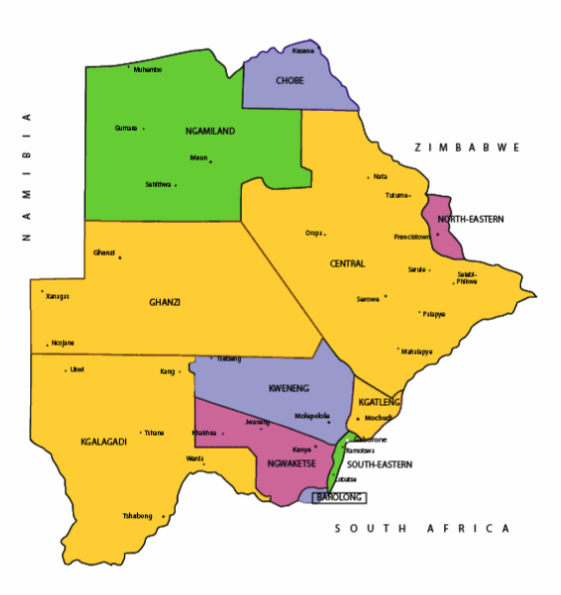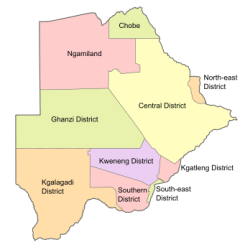Places and their polling stations in Francistown South, Botswana
072 Somerset East
0396 Mahube Primary School
0397 Somerset East Bcw
0398 Ntlo Ya Efangele
0399 WDC Day Care Centre
073 Boikhutso
0400 Lapologang Clinic
0401 WDC Day Care Centre
0402 Christ Citadel International Church (CIC)
074 Ikageleng
0403 Phase Iv Primary School
0404 Block 1 Open Space (Park)
0405 Phase Iv Community Hall
0406 Playground (Open Space – Jwaneng)
075 Phillip Matante West
0407 Block 2 Playgrounds (Swings)
0408 Phatsimo Primary School
0409 Open Space (Park)
076 Phillip Matante East
0410 Mokaleng Primary School
0411 Montsamaisa JSS
077 Tshwaragano
0412 Playground Block 9
0413 Botswana Pentecostal Protestant Church
0414 Open Space Next To Molapo Satellite Police Station
0415 Block 6 Open Space Opposite Tati River Lodge
078 Ipopeng
0416 Goldmine JSS
0417 Moremogolo Primary School
0418 Block 7 Vending Area
0419 Masego Clinic
Reference: iec.gov.bw/index.php/electoral-districts/polling-stations.html
Botswana
Botswana is a country in Africa. It is topographically flat, with approximately 70 percent of its territory being the Kalahari Desert.
It is bordered by South Africa to the south and southeast, Namibia to the west and north, and Zimbabwe to the northeast.
Capital: Gaborone
Currency: Botswanan Pula
Official language: English
Population: 2.588 million (2021) World Bank
Dialing code: +267
Gross Domestic Product: 17.61 billion USD (2021) World Bank
Botswana’s ten districts are:
- Southern District
- South-East District
- Kweneng District
- Kgatleng District
- Central District
- North-East District
- Ngamiland District
- Kgalagadi District
- Chobe District
- Ghanzi District
Botswana’s councils created from urban or town councils are: Gaborone City, Francistown, Lobatse Town, Selebi-Phikwe Town, Jwaneng Town, Orapa Town and Sowa Township.






The name Botswana refers to ‘Land of the Tswana’. The landlocked, Southern Africa country is officially known as the Republic of Botswana.














Botswana is connected to Zambia through the Kazungula Bridge making it the world’s shortest border between two countries.
A country of slightly over 2 million people (2021), Botswana is one of the most sparsely populated countries in the world. It is essentially the nation state of the Tswana ethnic group, who make up 79% of the population.

About 11.6 per cent of the population lives in the capital and largest city, Gaborone.
Formerly one of the world’s poorest countries—with a GDP per capita of about US$70 per year in the late 1960s—it has since transformed itself into an upper-middle-income country, with one of the world’s fastest-growing economies.


The Tswana ethnic group were descended mainly from Bantu-speaking tribes who migrated southward of Africa to modern Botswana, living in tribal enclaves as farmers and herders.




In 1885, the British colonised the area and declared a protectorate under the name of Bechuanaland.
As colonisation stopped, Bechuanaland became an independent republic under its current name on 30 September 1966.


Since then, it has been a representative republic, with a consistent record of uninterrupted democratic elections and the lowest perceived corruption ranking in Africa since at least 1998.

The economy is dominated by mining and tourism. Botswana has a GDP (purchasing power parity) per capita of about $18,113 as of 2021, one of the highest in subsaharan Africa.


Botswana is the world’s biggest diamond producing country.
Its relatively high gross national income per capita gives the country a high standard of living and the third-highest Human Development Index of continental Sub-Saharan Africa (after Gabon and South Africa).
The country has been adversely affected by the HIV/AIDS epidemic. In 2002, Botswana began offering anti-retroviral drugs (ARVs) to help combat the epidemic.
Botswana is a member of the Southern African Customs Union, the Southern African Development Community, the Commonwealth of Nations, and the United Nations.

